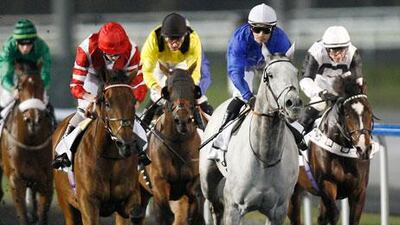William Haggas put an end to a five-year wait for success in the UAE last week and the English trainer will bolster his team in Dubai with the arrival of Entifaadha into international quarantine on Monday.
Haggas won with Sooraah in the Range Rover Sport Trophy on Thursday, the trainer's first winner in Dubai since Charlie Cool took the Muhtathir Cup at Nad Al Sheba. For a handler who has won the English Derby with the Khalifa bin Dasmal-owned Shaamit and was successful twice at the highest level last season with Dancing Rain, Dubai has proved frustratingly elusive for the Newmarket-based handler.
Most of his UAE-based owners transfer their horses to local trainers for the Dubai World Cup Carnival but despite Entifaadha running in the blue and white silks of Sheikh Hamdan bin Rashid, Haggas was given permission in October to prepare the three-year-old son of Dansili for the UAE Derby.
Entifaadha displayed some decent Group-race form in England as a juvenile last season but after four months strengthening up in Newmarket Haggas is excited by running the colt at Meydan racecourse on Thursday.
"I haven't had one good enough for Sheikh Hamdan until now," Haggas said at his Somerville Lodge base. "He thinks it is a great idea and Entifaadha has a bit more to offer in Europe yet, which is why he is probably still with me. He'll start off in the Meydan Classic over a mile, which should suit him. I'm not sure about the Tapeta surface but he's been training on Polytrack at home all winter so it shouldn't be a problem. He's not a very big horse and I'm looking forward to seeing him run in person."
Haggas has saved his trump card until last, however, and his best horse this campaign will not arrive in the UAE until March 24 before a tilt at the Dubai Sheema Classic seven days later.
The 51 year old is a believer in keeping his horses at home and Beaten Up will undergo a precise programme in England with a view to running in the US$5 million (Dh18.37m) middle-distance contest.
Beaten Up will race in an all-weather contest at Lingfield on Saturday before completing Haggas's meticulous groundwork by working under the floodlights of Wolverhampton racecourse to recreate the conditions on World Cup night.
The four year old has raced just three times but on his final start in October he won a Group 3 race by an easy four lengths, which suggests the Sheema Classic would be well within his compass. As an inside line, the horse is owned by Haggas's father, but the word has spread far and wide already about the latent talent lurking within the gelding's impressive frame.
"It was a hell of a run last time and I want to look at that performance in a positive light," Haggas said. "I haven't had him off the bit yet at home and we sold shares in him to two Australian owners over the winter.
"He's a fine looking horse, and although it's not my job to admire them, but bring the best out in them, it's hard not to just look at him on the gallops."
With such firepower at his disposal, Haggas may not have to wait another five years before he next visits the winners' enclosure in the UAE.
sports@thenational.ae

